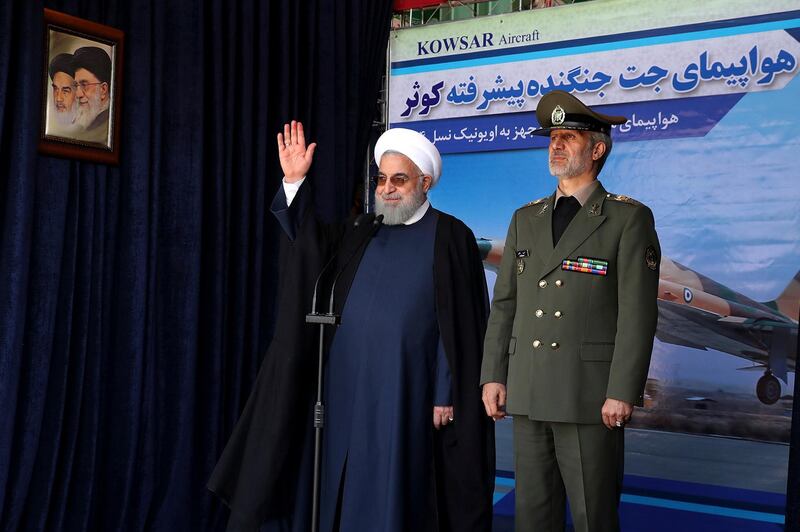Iran's Defence Minister Amir Hatami arrived in Syria on Sunday for meetings with “senior defence and military officials”, local news agencies reported.
Forces in Tehran have backed Syrian President Bashar Al Assad in the country's seven-year civil war.
“We hope to have a productive role in the reconstruction of Syria,” Iran’s semi-official Fars News agency quoted Mr Hatami as saying.
Washington has repeatedly criticised Tehran and its ally, Hezbollah, for their involvement in the conflict.
US national adviser John Bolton said last week that Iran should withdraw forces from the country. Israel has also expressed significant concern over Iranian government and proxy forces operating near the occupied Golan Heights. It has also struck dozens of Hezbollah and Iranian military targets in Syria, killing high-ranking members of both organisations.
Officials in Tehran say that their military presence in Syria is at the invitation of the government and they have no immediate plans to withdraw.
Estimates place the Iranian death toll, including of senior members of the elite Revolutionary Guards, at well over 1,000 since 2012.
Initially, the IRGC kept their role in the Syrian conflict quiet, but as casualties mounted they have been more outspoken about their engagement.
Meanwhile, a senior US diplomat visited Kurdish-controlled territory in Syria on Saturday as the group undertakes negotiations with Damascus regarding its future role in the country.
Ambassador William Roebuck said that US forces were also to stay in Syria, after conflicting statements from US officials in recent months including a call by US President Donald Trump to withdraw troops.
“We are prepared to stay here, as the president has made clear, to ensure the enduring defeat of ISIS,” Mr Roebuck said. He toured the town of Shaddadi in the north-western province of Hasaka after visiting the towns of Kobani and Manbij.
Kurdish officials have reportedly been meeting regime contacts in recent weeks in a bid to negotiate a deal for the future of a Kurdish majority area in north Syria. Unlike rebel groups and hardliners, the SDF and other Kurdish factions have not carried out significant battles with the regime.
Mr Roebuck is expected to continue to Deir Ezzor in the east where Syrian Democratic Forces, a US-backed coalition of Kurdish and Arab fighters, is fighting ISIS's last significant Syria stronghold.
______________
Read more:
US to act 'very strongly' if Syria uses chemical arms: John Bolton
How Putin is engineering a politically palatable way out of Syria
[ US 'not seeking regime change in Iran', says John Bolton ]
_____________
US support for the SDF has allowed it to expel ISIS from much of the country’s north-east. There was fierce fighting between the SDF, with significant US-led airpower and ground assistance, and ISIS in the cities of Manbij and Kobani.
The regime, with support from Iran, Russia and Hezbollah, has regained much of the territory lost to rebels and ISIS in the early years of the war.
Under Mr Trump, the US has again stepped up action against Iranian forces by pulling out of the 2015 nuclear agreement, reimposing sanctions and looking for ways to roll back Tehran’s influence in the region. Other parties to the 2015 agreement are still trying to find ways to save the agreement.
Iran's Foreign Minister Mohammad Javad Zarif said on Sunday that this was the US waging a psychological war against Iran and its business partners, Tasnim news agency reported.
"[America's] focus is on a psychological war against Iran and its business partners," Mr Zarif said.
Diplomatically, the UN Envoy for Syria, Steffan de Mistura, will host Iran, Russia and Turkey for talks on drafting a new Syrian constitution in mid-September.
Representatives of the three nations will meet Mr de Mistura at the UN's European headquarters in Geneva, spokeswoman Alessandra Vellucci said. He vowed to have a constitutional committee in place before world leaders meet at the General Assembly in New York next month.
It will probably require further talks, including with Mr Al Assad's government, but Mrs Vellucci said she had no details of additional meetings scheduled for next month.
Mr de Mistura's efforts to negotiate an end to the conflict have produced no breakthrough despite numerous rounds of peace talks in Geneva.





